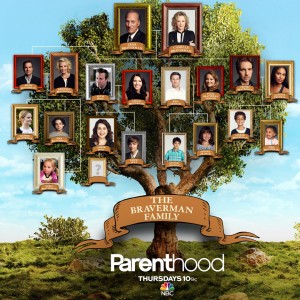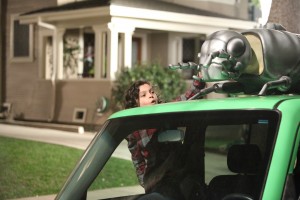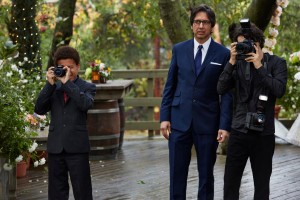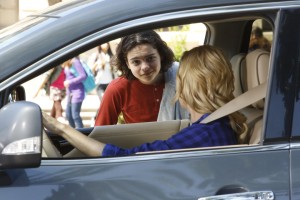What is Asperger’s? Asperger’s is a form of high functioning Autism. Autism is a broad-spectrum disorder that affects development. There are many distinctive symptoms that are different for every individual with Asperger’s. A few of the symptoms seen the most are challenges with communication and social interaction. As well as repetitive behaviors and obsessive interests (Mayo Clinic Staff).

The Autism Speaks logo, a blue puzzle piece with the words “Autism speaks It’s time to listen” in gray letters.
Overview: Parenthood is a six season series that chronicles the ups and downs in the lives of the four Braverman siblings and their own families. Adam and Kristina, the oldest of the bunch, find out in the first season that their son Max has Asperger’s. Their family’s story from then on focuses heavily on their journey with Max’s diagnosis and how it affects everyday life. Max helps shed light on the often misunderstood behaviors and feelings of Autistic people. A Buzzfeed article by Emily Orley explains the ways Parenthood can claim authenticity. Orley describes how the actor who plays Max, Max Burkholder, did a great deal to prepare for the role such as “researching the disorder, reading books, speaking with activists, getting involved with the advocacy organization Autism Speaks, and generally gaining a better understanding of what it means to be on the spectrum.” She also mentions the fact that Jason Katims, the director of Parenthood’s own son has Asperger’s give the show a certain credibility with their representation of Asperger’s. These factors allow Parenthood to have more credibility. The first three seasons targets family life and follows how Max’s diagnosis readjusts their lives. In the first few seasons, Max is too young to understand and process his diagnosis fully, but the last few seasons strongly represent Max’s own personal battles with Asperger’s. Michelle Diament from Disability Scoop comments that “The show’s heavy focus on life with a developmental disability is believed to be a first and so far audiences both with and without ties to autism seem to be responding.” The show has received a lot of positive attention for its representation of Asperger’s. Burkholder highlights this saying, “I recently got a letter from a girl who has Asperger’s and she thought that I was doing well” (Diament). This family gives a realistic view into what family life with an Autistic child is like and a deeper understanding of Asperger’s.

The Braverman Family Tree with pictures of the family members in frames on the background of a large tree, grass, and a partially cloudy blue sky.
Season One: The first season of the show establishes Max’s Asperger’s diagnosis. Max is illustrated as peculiar from the first episode. In conversation with one another, his parents reveal that he is not interested in socialization and prefers to play with his bug collection. Max’s temper tantrums at school start to create issues at school and eventually lead to Max’s diagnosis. Adam and Kristina struggle to come to terms with what Asperger’s means for Max and their family. The pair has a hard time accepting that there is something different about their son. At first, they use words like “wrong” in reference to Max’s Asperger’s and ask about different ways to cure it. After meeting with an Autism specialist, Doctor Pelikan, they better understand Asperger’s and accept Max for who he is. The best scene that shows the family’s acceptance is after weeks of trying to get Max to stop dressing up as a pirate for school, Adam dresses up as a pirate too and plays with Max. Another instance of acceptance is when Adam and Kristina relentlessly promote Max’s intelligence and humor in order to get him into a new school. Adam and Kristina are far from perfect but their blunders are what make the show so believable. At first, I was frustrated by the hard time they were having, but their struggling came from a lack of knowledge. Once they became educated on Asperger’s they learned how to relate to Max. This season captures the roller coaster of emotions that come with a new Asperger’s diagnosis. On top of its accuracy in portraying Asperger’s, Parenthood also does a great job of demonstrating Max’s as a whole character. We come to learn how intelligent and witty Max. Max and his family embody realism that can allow other families in the same situation comfort and hope.

Adam and Kristina, Max’s parents meet with Dr. Pelikan to discuss Max’s Asperger’s diagnosis. Kristina and Adam sit across from Dr. Pelikan facing him. Dr. Pelkian is mid-sentence with his hands crossing in front of him.
Season Two: The second season also focuses on Max’s family coping with and working on their understanding Asperger’s. One of the most influential episodes is when Kristina attends a support group for other parents who have a child with Asperger’s. At first, Kristina goes by herself but eventually Adam decides to join her. A very emotional and informative moment is when another mom speaks up about how much she loves her child but how hard it is to worry and to always have so much on her plate. Kristina tears up and you can see the relief she feels knowing she is not alone in feeling this way. Both Adam and Kristina process their emotions and learn how to better deal with Max’s diagnosis through relating to other parents. Another episode that is crucial is when Kristina and Adam have to tell Max he has Asperger’s. They were not going to tell Max until he was ready, but Max overheard a conversation about his diagnosis. Kristina and Adam call it a “disability” and Kristina breaks down crying, sending a negative message to Max. However, Dr. Pelikan encourages them to redo it and explain the good and the bad to Max in a positive way. Adam and Kristina’s mistakes show the realities of life. Both of them are doing the best they can and learning as they go. This show can serve as a kind of support “group” for other parents, showing the ups and the downs but ensuring that everything is going to be all right. Kristina and Adam are far from perfect but they are real and seeing this can encourage and give parents hope everywhere.

Max in awe has he climbs up a bright green car to touch the extra large plastic ant that rests on top the car.
Season Three: Season Three continues showing how Max’s family deals with his diagnosis, but takes a slight shift and begins to look at how Max deals with personal relationships. Both Adam and Kristina are working again and in the midst of work schedules and a busy life, a museum trip Max had planned falls through the cracks. The job of taking Max is then passed on to Haddie. However, she is busy studying so she tells Max they will not be going. Max ends up running away in an attempt to go to the museum alone, sending the whole family into a panic. Once Max is safely found, Haddie yells at him wondering why things cannot be normal and why Max is so selfish. The realities of Asperger’s make it hard for Max to understand certain rules and dangers, and the way that they affect other people. We observe the way Asperger’s affects the whole family and their relationships. Max does not think about how his family feels because this thought process is not natural to him. Recognizing this fact helps to understand Autistic behaviors and the reasons behind them. This can provide relief to families who are dealing with similar issues. This show can offer insight into certain behaviors common with Asperger’s and give examples to relate to. It is important for Max’s family and all families to come to terms with the way Autistic children think and acts so they can take precautions to ensure safety.

Max wandering alone after trying to go the museum by himself. Max is wearing a gray shirt, blue jacket, and jeans. He walks past crowds of people.
Season Four: In season four Max is in middle schools and his Asperger’s begins to affect his social development more prominently. As he starts his first days of school, he gets hung up on the fact that there is no vending machine where one used to be. This fixation affects his relationship with his friend Micah because it is all Max talks about. Max’s parents point out that he needs to compromise and sometimes do things that Micah wants to do. Max has a hard time grasping the complex rules of friendship. With his parent’s guidance, Max is able to accept that this and learn to compromise. Despite his personal struggles, a positive about Max’s obsession with the vending machine is that it motivates him to run for student council president. Though his behaviors sometimes have their setbacks, they also have many benefits as well. Another episode that demonstrates Max’s development is when Adam tried to talk to Max girls. Max tells Adam he is not ready to talk about this topic. Adam later tells Kristina usually things do not embarrass Max, but he feels Max recognized his limitations with relationships. Both his parents feel sad about this but know that he has the potential to develop great relationships in time. We see Max’s humor come out in these episodes through his honesty. Since he is not easily embarrassed, he is extremely confident and outspoken about what matters to him. Though we begin to see many complications in Max’s relationships, he is very intelligent and with the help he receives from his parents, he starts to understand the proper ways to interact with others. This season shows Max begin to grow and mature and the way his Asperger’s impacts that. Despite the hardships, the show does a great job showing that Max’s diagnosis has many positive aspects as well.
Season Five: As Max grows older he is presented with countless social challenges that he has to work to overcome. Max has a difficult experience on a field trip when kids begin to bully him. He has a meltdown and leaves upset wondering why all of the kids hate him so much. Max thinks he is a freak and asks if he is so smart why can he not understand the other kids. Adam and Kristina struggle to console him. This scene is extremely emotional; it characterizes the real struggles that both parents and children have while dealing with Asperger’s. Buzzfeed comments on the emotions in this scene saying “It’s a moment that showcases a realistic situation many people on the autism spectrum, like Max, and the families of those people unfortunately, deal with regularly” (Orley). The director, Jason Katims, discusses the need for such an intense scene. “He knew the difficult scene was on the horizon. “I had this instinct that I really wanted to make sure we weren’t sugarcoating the experience of what it would be like for Max.” (Orley). The show strived to show the full range of emotions experienced, even the impossible parts. Throughout the rest of the season on a more positive note, Max finds a love of photography through Hank, his Aunt Sarah’s on and off boyfriend. Max joins the yearbook to be a photographer but has a hard time understanding boundaries in what pictures he can and cannot take. This is a hard point for Max to understand and his parents help coach him through it. Later in the season, Hank begins to discover that he too may have Asperger’s and goes to see Doctor Pelikan. Hank becomes a symbol of hope for Max’s future development. The show works to show the reality of situations and also create a hopeful message for those living with Asperger’s.
Season Six: The final season of Parenthood focuses even more on Max’s personal growth as he learns to deal with relationships. Max is attending a charter school his mother began for kids with similar disabilities and special needs. As he starts his new school he meets a girl named Dylan and beings to develop feelings for her. He starts to ask his parents for advice and takes it very literally. He looks up information on the Internet about how to get a girl to like you. Dylan does not feel the same about Max and when he sees her kissing another boy he gets very upset. He created flyers about why the other boy should be expelled. He continually tries to express his feelings for Dylan and she gets very upset and says Max is harassing her. Max eventually, with guidance from his parents, comes to understand that he needs to respect people’s boundaries. He apologizes to Dylan and they leave on good terms. Throughout the season Max has struggled to express emotions, and through his feelings for Dylan, he begins to learn how to show his feelings. Kristina talks about how proud of Max she is and says despite the fact that Max is hurt he accomplished something so great in being able to say how he feels. In the final episode, Max successfully photographs Hank and Sarah’s wedding. He takes beautiful pictures and fully realizes his passion for photography. This indicates not only Max’s bright future in photography but the amazing relationships he can have seen through Hank and Sarah. Parenthood greatly developed Max’s character over many seasons and showed his growth through his dealing with Asperger’s.

Max and Jabbar, his cousin, dressed fancy taking pictures at Hank and Sarah’s wedding. Hank stands behind them watching.
Shortcomings: Despite overall credible representations, there are aspects of the show that have caught the attention of critics. One major criticism in the way Adam and Kristina handle Max’s diagnosis. “Yet, time and again, it is Adam and Christina who seem to me the ones who are self-centered and cut off from Max’s feelings. The evidence is subtle, but on so many occasions the real “issue” at hand was Adam or Christina’s pride, fear, dreams, and craving for “normalcy”, not Max’s needs or wishes” (Disability Thinking). I agree that sometimes Kristina and Adam were selfish at times, but at the end of the day they did put Max first and overcome their own issues to support and understand Max. I believe that their struggles demonstrate the real thoughts and emotions many parents go through when dealing with a similar diagnosis. The same critic later goes on to say, “In case I’m not clear, I love “Parenthood”, and think that its portrayal of Max is extremely valuable.” Despite some shortcomings, overall Max gives a good representation of Asperger’s that is important for creating awareness. Another criticism discusses the character, Hank. Some people thought the show did not do as well handling Hank as they did Max. However, Katims states that he wanted Hank’s character to fully demonstrate the spectrum of Autism. He wanted to show that those with Asperger’s could have families, relationships, and jobs. (Orley). I agree that Hanks character helps to establish a true spectrum. No case of Autism is exactly the same and Hank does go to show that this diagnosis does not prevent someone from having a successful career and happy, healthy relationships. Another criticism is Max can be seen categorized in the “supercrip” stereotype based on his extreme intelligence (Holton). “Max owns his condition and its label and at the same time notes that he is “smart” and “remembers almost everything.” This cues a positive reaction from his peers, who seem to suddenly respect him more for his Asperger’s.” (Holton). In some ways the show does highlight the very good characteristics of Max’s diagnosis, I feel that this is to show that Asperger’s should not be seen as negative. In showing Max’s intelligence and showcasing his blunt humor we see him as a whole character beyond his disorder. One final criticism is that no one with Asperger’s themselves in consulted about Max’s portrayal. “The writers of Parenthood, none of whom have Asperger’s, have based their interpretations of the diagnosis on secondary experiences” (Holton). Perhaps this can serve as a guide for upcoming shows that plan to feature Asperger’s. The input from someone with the disorder themselves can offer much more accurate advice than even the best experts. Something I noticed on my own is that in the first few seasons at times everything seemed to work out in ways that seemed too good to be true. Some of the times things did seem “sugar coated” but as Max grew up things became more and more realistic. I believe Parenthood found ways to make the show more believable as their understanding of Autism expanded over the years. While there are shortcomings pointed out by a few the overall consensus is that Max’s representation does a great job bringing awareness to Asperger’s.
Conclusion: Through forming my own interpretations of episodes and reading other blogs on Parenthood I was able to capture a comprehensive view of how Parenthood portrays Asperger’s. Katim’s son and Burkholder’s research on Asperger’s help to create an accurate representation of what life with Autism is like. Not only is Max’s portrayal amazing, but also his family’s reactions and struggles as they cope with his diagnosis are authentic. Katim’s intimate understanding of Asperger’s and how it affects normal, everyday life is extremely evident in the realism seen in the series. Disability Thinking asserts, “the depiction of Asperger’s seems to be reasonably accurate and free of truly ugly stereotypes”. In the shows attempts to remain free of stereotype, they have succeeded in sending the message that Max is much more than a kid with Asperger’s. Burkholder attests to this saying, “But it’s not as much about playing someone with Asperger’s; it’s about playing Max Braverman” (Orley). Asperger’s is only a small part of Max’s big character. Parenthood does an amazing job in developing Max not only in overcoming aspects of his diagnosis but, as a person. He discovers his passions, makes friends, and falls in love. He has the same experiences as the rest of us and Parenthood does a wonderful job of showcasing that. The authentic way in which Max Braverman is characterized through Parenthood helps to raise awareness for Autism.
Sources:
Photo One: Found on google, “Autism Speaks Logo”, http://www.autismspeaks.org/sites/default/files/logo.jpg
Photo Two: THE BRAVERMAN FAMILY TREE. 2014. NBC Universal Media, LLC. NBC, http://www.nbc.com/parenthood/photos/the-braverman-family-tree/2081746. Accessed November 28, 2016.
Photo Three: Faced with distraught parents, a doctor sometimes has to treat the whole family. 2010. NBC Universal Media, LLC. NBC, http://www.nbc.com/parenthood/photos/season-1/heated-moments/168926. Accessed November 28, 2016.
Photo Four: Photo from “Amazing Andy and His Wonderful World of Bugs”. 2011. NBC Universal Media, LLC. NBC, http://www.nbc.com/parenthood/photos/season-2/amazing-andy-and-his-wonderful-world-of-bugs/172196. Accessed November 28, 2016.
Photo Five: Photo from “Missing”. 2011. NBC Universal Media, LLC. NBC, http://www.nbc.com/parenthood/photos/season-3/missing/174571. Accessed November 28, 2016.
Photo Six: “Together”. 2012. NBC Universal Media, LLC. NBC, http://www.nbc.com/parenthood/photos/season-4/together/176466. Accessed November 28, 2016.
Photo Seven: “All Aboard Who’s Coming Aboard” Episode 502. 2013. NBC Universal Media, LLC. NBC, http://www.nbc.com/parenthood/photos/season-5/all-aboard-whos-coming-aboard/177966. Accessed November 28, 2016.
Photo 8: Cohen, Ben. Photo from the episode “May God Bless And Keep You Always”. 2014. NBC Universal Media, LLC. NBC, http://www.nbc.com/parenthood/photos/season-6/may-god-bless-and- keep-you-always/2210111. Accessed November 28, 2016.
Orley, Emily. “How “Parenthood” Broke Down The Autism Awareness Barrier.” Buzzfeed Entertainment, 24 Sept 2014. https://www.buzzfeed.com/emilyorley/how-parenthood-broke-down-the-autism-awareness-barrier?utm_term=.miLeYLELP3#.voVOxnYnBa. Accessed November 28, 2016.
“I Can’t Stand Watching “Parenthood”, But I Can’t Stop Watching It.” Disability Thinking, 9 March 2014. http://disabilitythinking.blogspot.com/2014/03/i-cant-stand-watching-parenthood-but-i.html. Accessed on November 28, 2016.
Mayo Clinic Staff. “Autism Spectrum Disorder.” Mayo Clinic. 1998-2016. http://www.mayoclinic.org/diseases-conditions/autism-spectrum-disorder/basics/definition/con-20021148. Accessed November 28, 2016.
Holton, Avery. “Alienating Asperger’s: Parenthood and What’s Wrong With Max.” In Media Res. 12 May 2014. http://mediacommons.futureofthebook.org/imr/2014/05/12/alienating-asperger-s-parenthood-and-what-s-wrong-max. Accessed November 28, 2016.
Diament, Michelle. “Max From NBC’s ‘Parenthood’ Talks Asperger’s.” Disability Scoop. 9 November 2010. https://www.disabilityscoop.com/2010/11/09/parenthood/11084/. Accessed November 28, 2016.

